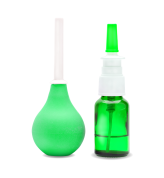Skip navigation links

NoseAllergiesDrynessCold
Nose care: good habits to adopt

To keep your nose and airways healthy, practicing proper hygiene habits and avoiding certain aggravating factors can make all the difference.
Proper nasal hygiene is essential to the nose’s good function. It reduces cold symptoms, sinus infections, allergies and helps prevent infection. It is important to maintain proper nose care since the nose has many very important functions. It warms, humidifies and purifies the air we breathe. It protects us from external threats by filtering particlesin the air with its mucous membrane. It is also responsible for our sense of smell and helps project the sound of our voice.
The protective role of the mucous membrane
The mucous membrane protects us from external threats with its mucous, which blends with impurities. Then, the small nose hairs on the mucous membrane direct these impurities toward the throat and then the stomach. Stomach acids permanently eliminate these impurities. Sneezing is also a way of getting rid of impurities. Proper nose hygiene helps the mucous membrane protect the body.
Establishing a routine for nose care
Proper nasal hygiene starts with healthy living habits by reducing external threats in your environment. Here are a few small tips on how to reduce external threats in your environment:
- Avoid carpets;
- Don’t let dust accumulate on objects;
- Clean your home regularly;
- Humidify the air in your home;
- Avoid smoking and second-hand smoke.
Proper nasal hygiene is maintained by cleaning the nose regularly. Cleaning your nose should be part of your daily routine just like brushing your teeth. Using saline water based products helps clean nasal cavities and eliminate impurities. Several products are available on the market such as those by RhinarisTM. They can be found in the form of droppers, single-dose ampoules, nasal sprays and flushers. The product you choose will depend on your age and preferences. Some formulations said to be isotonic or hypertonic are available. Isotonic saline-water-based products contain the same salt concentration as those found in the human body, contrary to a hypertonic solution which has a higher salt concentration. There are also nasal sprays with a flow mist that varies from low pressure to high pressure and others that contain eucalyptus. It can sometimes be confusing. Ask your pharmacist to help you choose the product that best suits your needs.
Nasal hygiene for babies
Young children are more likely to suffer from respiratory infections. Because their immune system is not completely developed and they are often in close contact with other children (such as in a daycare setting), this partly explains the high rate of respiratory infections in young children. Young children are also more prone to infection because they have narrow nasal cavities, are unable to blow their noses and spend a lot of time in a sleeping position. This is why it is important to clean the nose by using saline water products on a regular basis to prevent infection.
Nasal hygiene and infection
Millions of Canadians suffer from colds each year. On average, an adult will suffer from one to two colds each year. There is no cure for the common cold, only ways of reducing its symptoms (runny nose, cough, nasal congestion and sore throat). The use of saline water to clear out nasal passages is a safe and effective way of relieving cold symptoms. This also applies to sinus infections. Clearing nasal passages relieves nasal congestion and helps get rid of viruses and bacteria.
Nasal hygiene and allergies
Your nose constantly comes into contact with allergens (mites, pollen and mould). Some people develop allergic reactions accompanied by nasal congestion and sneezing. Using saline water to clean your nose will help reduce your symptoms and eliminate allergens found in mucous.
Dry nose
Dry nose is a common problem whose typical symptoms include a tingling or burning sensation in the nose, dried-up mucous and crusting. It is very uncomfortable and makes us vulnerable to infection. There are several causes of dry nose. Here are a few examples:
- Low humidity levels;
- Heating systems used in homes in the winter time;
- Aging;
- The use of nasal sprays to administer certain medications;
- Radiation treatments on the head or neck.
To relieve dry nose, it is important to start with proper nose hygiene each day. Next, a nasal lubricant such as RhinarisTM NozoilTM is a good way of hydrating dry or irritated nasal passages.
Here are a few tips on how to maintain healthy nasal hygiene:
- Maintain proper humidity levels in your home;
- Avoid letting dust accumulate in your home;
- Avoid cigarette smoke;
- Maintain a daily nasal cleansing routine especially for young children;
- Clean the nose more frequently when you have a respiratory infection or allergies;
- Use gentle non-irritating products that are specially made for nasal hygiene. Homemade remedies should be avoided.
Don’t hesitate to talk to your pharmacist if you have questions about nasal hygiene or about the different products available to you.
In collaboration with

See also
- The owner pharmacists of pharmacies affiliated with the Jean Coutu network provide the drugs and pharmaceutical services presented in this section.

No comments:
Post a Comment